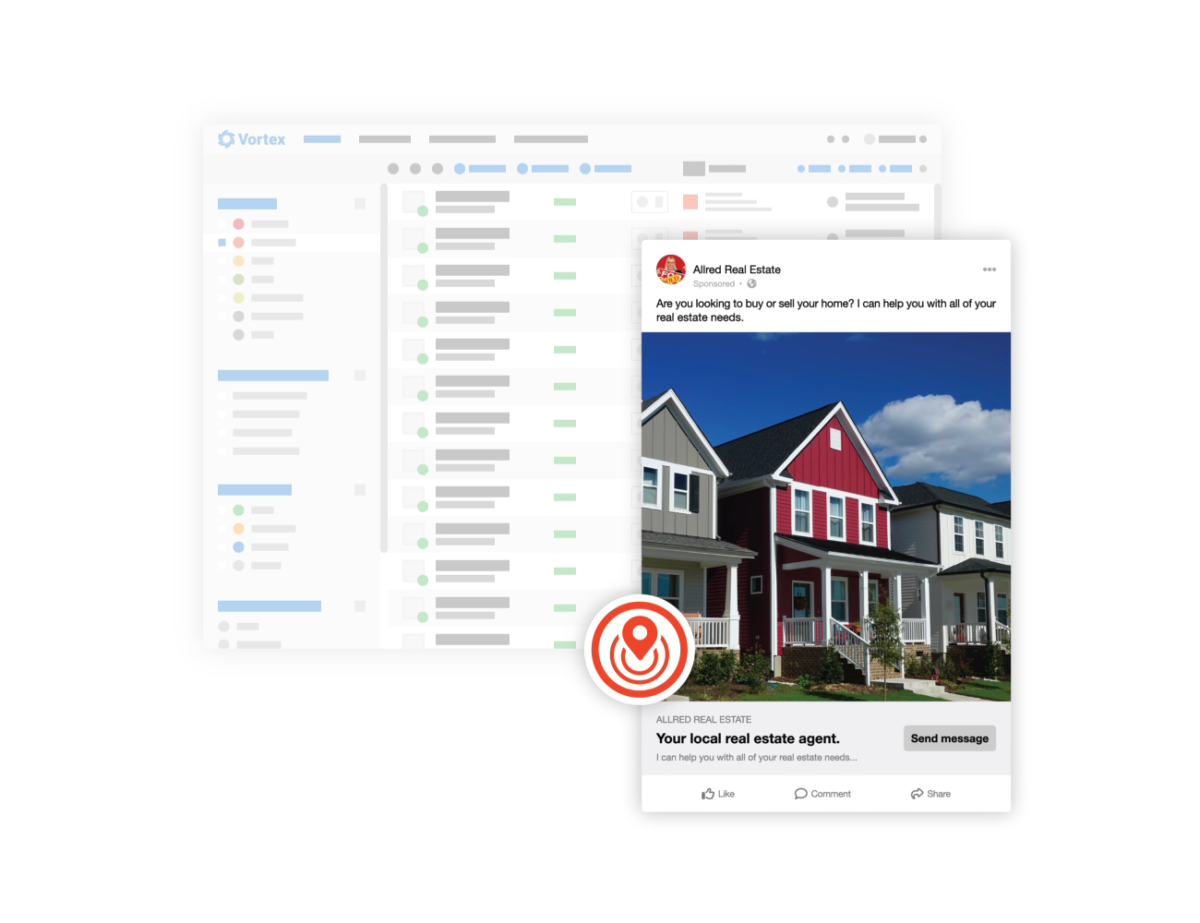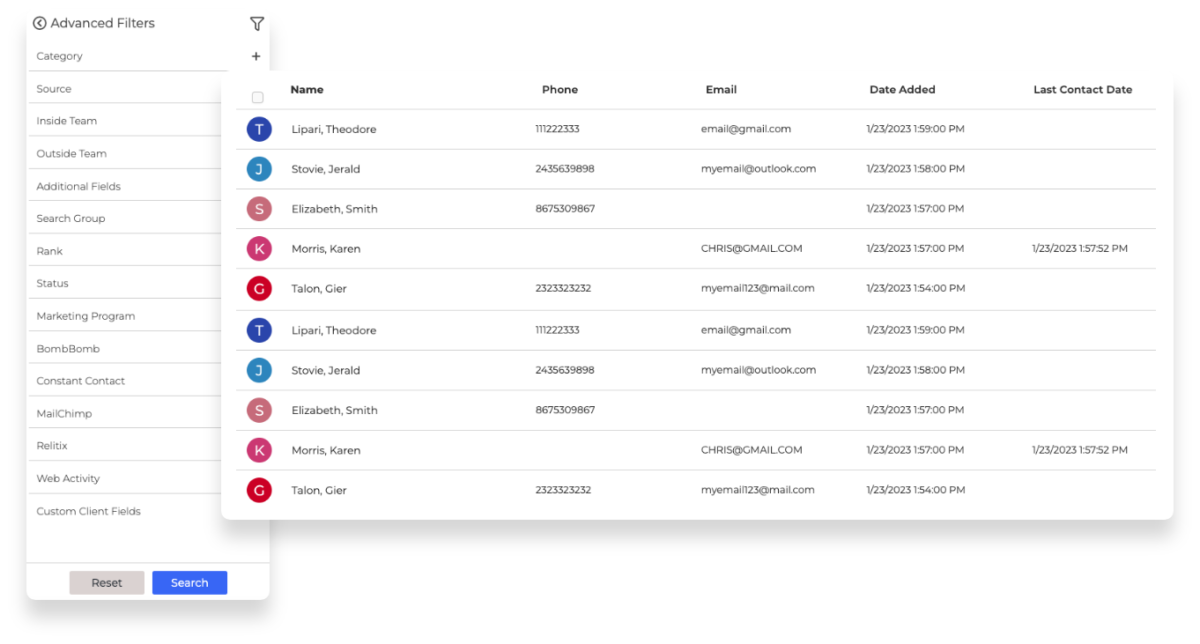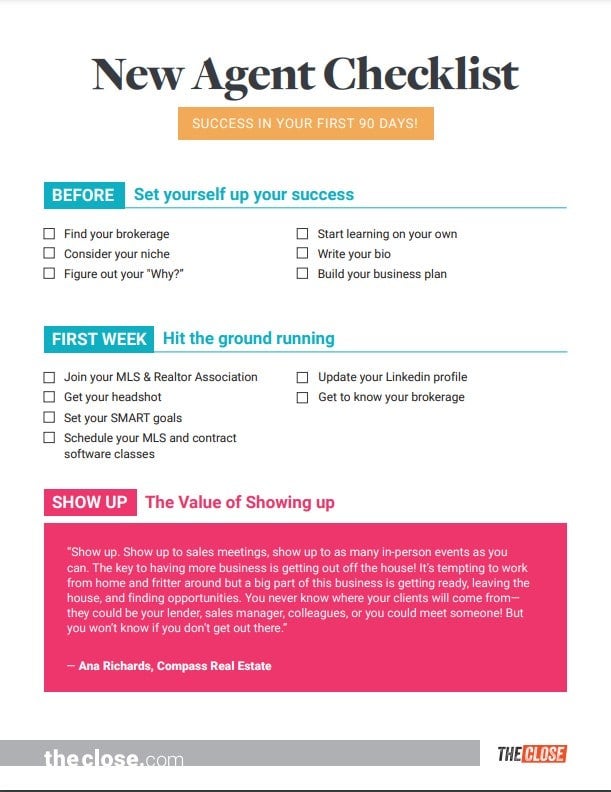The first few months in real estate are critical for building a strong foundation for any business, but especially so in building a real estate business. This new real estate agent checklist is designed to guide you through this period, helping you get on the path to success faster.
Earning money in real estate doesn’t happen overnight—you only get paid once you close a deal. It might take some time to see the results of your hard work, but with the right approach, you can speed up the process and start closing deals sooner. Let’s dive into the real estate agent checklist to get you up and running!

Step 1: Set up Your Essentials
First off, Congratulations! If you’re reading this article, you likely have recently obtained your real estate license and are ready to start your journey as a real estate agent. It feels like an amazing accomplishment to have passed the real estate exam—but now what?
-
Choose a brokerage and get to know them: Select a brokerage that matches your career goals and offers the support you need, focusing on training, culture, commission, and mentorship.
-
Set up your business essentials: Start by setting up a professional email and phone number, get business cards, and update your social media to reflect your new role.
-
Get familiar with the market: Research neighborhoods, property values, and trends; attend open houses, and build a strong understanding of your market.
-
Start building your database: Begin with your sphere of influence—friends, family, colleagues—letting them know you’re a real estate agent. Keep adding contacts to grow your leads and referrals.
-
Set realistic goals: Define clear, achievable goals for your first year, like transactions, income targets, or new contacts, to stay focused and motivated.
Step 2: Start Your Lead Generation
Unfortunately, leads don’t just come to you. Start by aiming to have 50 real estate conversations per week. Play to your strengths and decide whether you’ll invest time, money, or both. For example, open houses are low-cost but time-consuming, so if you don’t have a listing, ask an experienced agent to host one of theirs.
Focus on lead-generating activities that fit your budget and maximize conversations, like following up with cold calls after an open house to keep the momentum going. Cold calling is, by far, the fastest way to build your database and get in touch with potential leads. It’s definitely worth adding to your real estate checklist.

If you’re looking to make your dollar go further, REDX is a great choice for new agents looking to generate leads in this way. They have a power dialer that will get you in front of a large audience fast so you can start converting leads into clients ASAP.
Pro Tip: Take time to reflect on what drew you to real estate in the first place—whether it’s the freedom, the connection, or being your own boss. Your “why” is your anchor, especially when things get tough. As Simon Sinek says, “People don’t buy what you do; they buy why you do it.”
Step 3: Use Your Brokerage Tools
Get to know your brokerage and make the most of it—it’s not just a place to hang your license but a goldmine of resources that can set you up for success. Each brokerage is unique, so understand what yours offers, from tools and training. By fully using what your brokerage provides and networking with the right people, you will elevate your business and make the most of your new workplace.
-
Join training programs: Make it a priority to attend your brokerage’s training sessions—they’ll give you the skills and knowledge you need to start strong.
-
Find a mentor: Connect with an experienced agent who can guide you, offer market insights, and share tips that only come with experience.
-
Use marketing and support tools: Take advantage of your brokerage’s resources like marketing templates, photography, and administrative support to build your brand and attract clients.
-
Attend brokerage events: Engage in brokerage events to learn, network, and stay updated on industry trends—these are great for growing your knowledge and connections.
By tapping into all the resources your brokerage offers, you’re laying the groundwork for long-term growth. Remember, your brokerage is there to support you—so take full advantage of everything they have to offer. If you still need some help choosing a brokerage, check out our review of the best real estate companies to work for.
Step 4: Put Yourself Out There
Now that you’ve established what you need to do, now it’s time to actually do it—and you need to start getting noticed. Remember, the goal of putting yourself out there as a real estate professional is to create a strong personal brand that helps you stand out from the crowd.
Let’s take a look at a few things you should do to make sure you’re getting seen.
-
Write a great bio: Create a bio that really shows off your strengths and what makes you unique.
-
Get a professional headshot: A great headshot is worth the investment—make sure it’s professional, confident, and approachable, and use it everywhere.
-
Build your online presence: Keep your website and social media profiles up to date and aligned with your brand so potential clients know exactly who you are.
-
Network online and offline: Get out there and connect—whether it’s through social media or local events, the more people you meet, the better.
-
Share valuable and relatable content: Post helpful tips, market insights, and content that speaks directly to what your audience needs.
-
Use client testimonials: Let your satisfied clients do the talking—sharing their positive experiences can build trust with new prospects.
-
Be active in your community: Get involved in local events and initiatives to show your commitment and make sure people know who you are.
Don’t just rely on a single social media post to announce your real estate career—many people might miss it. Let your entire sphere of influence know you’re in the business because conversations about real estate are opportunities you don’t want to miss. Personal connections often lead to your first sales. People want to support you but can only do that if they know what you’re doing. Consistently remind your network, or you might miss out on potential deals.

Keep your branding and marketing simple, especially in your first month—getting bogged down with too many options is easy. Agent Crate is a great tool for new agents because it offers easy-to-use templates and ready-made content, so you will quickly get your brand out there without spending a ton of time. Agent Crate lets you create professional-looking social media posts, flyers, and business cards in no time, letting you focus on connecting with clients and building your business from the start.
Pro Tip: Need some bio-writing tips? We got you covered. If writing your bio is something you are really struggling with, hiring a professional freelancer is an option. Just make sure it’s in your voice!
Step 5: Build Your Tech Stack
With so many tools out there, it’s like being a kid in a candy store—except these treats help you close deals faster, manage your clients better, and make your life a whole lot easier. From customer relationship management CRMs that keep you organized to virtual tour software that wows your clients, there’s no shortage of gadgets and apps designed to boost your real estate game.
The Close is a great resource to check out different tools, checklists, and tips for new real estate agents, so let’s take a look at tech tools that will take your business to the next level.
-
Customer Relationship Management (CRM) Software: A good CRM is the backbone of your business. It helps you keep track of leads, manage client relationships, and automate follow-ups. Look for a CRM that allows you to organize contacts, set reminders, and track communication history.
-
Transaction Management Software: Keeping track of all the details in a real estate transaction can be a hassle, but transaction management software makes it easy. Some brokerages may provide one and require you to use it—and that’s fine too! These programs help you organize contracts, deadlines, and documents in one place, so nothing slips through the cracks.
-
Cloud Storage & Electronic Signature Software: Cloud storage solutions like Google Drive and Dropbox help you securely store and access documents from anywhere, making it easy to share files with clients and colleagues. Pair this with electronic signature software like DocuSign or Adobe, and you can handle contracts quickly and securely online.
-
Social Media Marketing Tools: Having a solid social media presence is key to an agent’s success, but it doesn’t have to take up all your time. With the right tools, you can easily create professional-looking posts, keep your branding consistent, and stay active online without the hassle. These tools let you schedule posts and manage everything in one place, making it easy to connect with your audience and grow your business.
-
irtual Meeting & Video Tools: Virtual meeting and video tools have become more popular over the years, making it easy to connect with clients no matter where they are. Platforms like Zoom allow you to conduct virtual tours, host meetings, and stay in touch with clients. Other platforms, like BombBomb, add a personal touch by allowing you to send personalized video messages via email.
-
Virtual Tour & Virtual Staging Software: With virtual tours, buyers can explore homes from anywhere, getting a real feel for the space. Virtual staging adds a finishing touch by digitally furnishing rooms, helping buyers imagine living there. These tools make your listings stand out and reach more potential buyers, so be sure to add this to your listing agent checklist.
-
Dialers & Communication Tools: When you start thinking about adding cold-calling to your business, dialers and other communication tools become a must have tool. Dialers help you manage calls, track follow-ups, and ensure no lead slips through the cracks.
-
Open House Tech Tools: Hosting an open house? With the right open house tech, you will streamline the whole process. Use digital sign-in apps, virtual tours, and automated follow-ups to capture leads and make a great impression. These tools help you manage visitors and show off the property effortlessly, turning casual visitors into serious buyers.
-
Referral & Lead Generation Tools: Growing your real estate business starts with finding the right clients, and referral and lead generation tools can help make that happen. Whether you’re using a CRM to keep track of leads or tapping into referral networks to connect with ready-to-move buyers and sellers, these tools are key to keeping your pipeline full. By mixing and matching the right tools, you will stay organized, build strong relationships, and turn prospects into loyal clients, helping your business thrive.
-
Must-have Apps for Agents On-the-Go: Let’s face it—successful agents are always on the move, often spending more time in their car than at a desk. That’s why having reliable apps that work anywhere is so important. Whether you’re between showings or on the road, these real estate apps help you stay connected, creative, and efficient, ensuring you can manage your business no matter where the day takes you.

Wise Agent CRM is a powerful tool designed to help real estate professionals streamline their business. With its easy-to-use interface, you can manage leads, automate follow-ups, and keep track of all your client interactions in one place. It’s the perfect solution to stay organized and grow your business efficiently.
Step 6: Navigate Your First Deals
You’ve implemented all the items on the new real estate agent checklist so far, and you now have your first deal under contract. What’s next? Your first few real estate transactions are both exciting and nerve-wracking. It’s sure to bring new learning experiences that will set the stage for your future in real estate.
-
Lean on your mentor: If you’re unsure about something, don’t hesitate to reach out to your mentor or broker—they’ve been through it and can offer solid advice.
-
Double-check everything: The details matter—make sure that your paperwork is spot-on and that deadlines are met to keep everything on track.
-
Communicate and stay organized: Keep your clients in the loop and stay organized to make sure things go smoothly. Automate tasks when you can, delegate when possible, and prioritize your most important tasks.
-
Stay calm under pressure: Real estate can get stressful, but staying calm helps you handle any issues and reassures your clients. Manage your time with time-blocking so you can stay focused during any situation.
-
Learn and grow: Every deal is a learning opportunity—take time to reflect, get feedback, and keep improving your approach. Review your progress continuously and make adjustments where needed.
Step 7: Be Aware of Bumps in the Road
Real estate is stressful and can be hard. Anyone who tells you any different is lying. Prepare yourself now for any potential bumps in the road. Here are just a few examples of what can go wrong in a transaction.
- Deals will fall through, and that commission you were counting on might disappear, leaving you wondering how you’ll manage until the next one closes.
- There will be tough clients who make you question why you got into this business in the first place.
- The market will have its ups and downs, with high highs and even lower lows. Staying informed about the latest trends will help you navigate through any season.
- Life doesn’t slow down, and neither does business. Balancing your time and maintaining a work-life balance will be challenging.
- Rejection is a part of the business. Get used to hearing “no,” but always learn from it.
My advice? Don’t be afraid to fail, and be ready for any challenges with a financial safety net for when commissions don’t come through. Lean on your network for support and advice. Keep up with market trends so you can adjust as needed, and make time for yourself to avoid burnout. With a little preparation and the right mindset, you’ll be able to get through it and keep moving forward.
Step 8: Keep Growing
Continuous growth is the key to long-term success. The industry is always evolving, and as agents, we have to stay on top of the latest and greatest. That’s why it’s so important to hone your skills, expand your knowledge, and explore new opportunities.
-
Invest in continuing education: Continuing education is a required part of keeping your license, but be sure to take specialized courses and earn certifications to enhance your skills.
-
Seek out mentorship: Connect with mentors and peers to gain insights and explore new opportunities.
-
Embrace technology and innovation: Try out the latest tech tools to make your work easier and stay ahead of the curve. Be sure to click here and subscribe to The Close for the latest updates and product reviews.
-
Focus on personal development: Growing as a person is just as important as growing as a professional.
-
Set goals and learn from your experiences: Regularly check in on your goals, and use what you’ve learned to keep growing and moving forward.
Embracing a mindset of always learning and growing will help you stay current and deliver top-notch service to your clients. Keep following this new real estate agent checklist, and you will set yourself up for long-term success in your real estate career.
Step 9: Set Your Sights High
Setting ambitious goals and striving for continuous improvement is essential for long-term success. Whether you want to close more deals, expand your client base, or grow your expertise, goal setting will keep you motivated and focused.
-
Start with a vision: Imagine where you want your real estate career to go—whether it’s closing more deals, expanding your reach, or mastering a new niche. Visualize what you want your business to look like and create a vision board to reference while you’re working to achieve your goals.
-
Break down goals: Once you have your big goals in mind, break them down into smaller, actionable steps. For example, if your goal is to increase your transactions, identify specific tasks like boosting your lead generation or improving follow-up processes by using a CRM.
-
Plan your path: Develop a strategic plan that outlines the steps you’ll take to reach each milestone. Consider what resources you’ll need and set realistic timelines to keep yourself on track.
-
Monitor and adjust: Regularly check in on your progress. Are you hitting your targets? If not, adjust your strategy. The market can change, and so should your approach—stay flexible.
-
Get support: Don’t go it alone. Share your goals with a mentor, colleague, or accountability partner who can offer guidance and keep you motivated. Their insights and encouragement can make a big difference.
-
Celebrate along the way: As you make progress, take time to celebrate your wins. Whether it’s reaching a sales milestone or completing a big project, acknowledging your achievements keeps you excited for the next challenge.
By starting with a clear vision, breaking down your goals, and staying adaptable, you’ll keep moving forward and reaching new heights in your real estate career. And remember, the journey is just as important as the destination—so enjoy the ride!
Bringing It All Together
Starting your real estate career can feel overwhelming, but with the right approach and tools, you’re setting yourself up for success. By putting yourself out there, staying organized, and making the most of the resources available to you, you’ll build a strong foundation for a thriving business. Take it step by step, and soon you’ll be on your way to reaching your goals.













Add comment